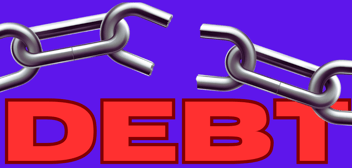10 Tips for Bouncing Back from the Holiday Spending Hangover
December 29, 2023

The hustle and the bustle of holiday shopping is now a thing of the past. We're here to show you how to banish the ghosts of overspending past and reclaim your financial sanity. Let the budgetary rehab begin!
Tis the season to be jolly, but if you're feeling less ho-ho-ho and more oh-no-no after the holiday spending extravaganza, we've got the cure! The holiday spirit might have decked your halls with joy, but it also may have left your budget looking like a crumpled wrapping paper nightmare. Fear not! Education First Federal Credit Union has the perfect antidote to your financial hangover.
1. Face the Festive Fallout Head-On. Before we dive into the nitty-gritty of budget resurrection, take a deep breath and confront the cold, hard truth. This moment of reckoning is crucial for your financial well-being. So, grab a cup of coffee and prepare yourself to face the music. It's time to log into your bank account, tally up those credit card receipts, and assess the damage.
As you review your bank account balance and credit card bills, it's natural to feel a mix of emotions. You might be tempted to bury your head in the sand and ignore the numbers, but that won't solve anything. Acknowledging the reality of your financial situation is the first step towards recovery.
2. Create a Holiday Spending Snapshot. One of the most important steps in financial recovery is to identify where your spending went off track. It's also helpful to think about why you went over budget so you can prevent the same mistake next year.
Many people report that shopping for unplanned gift recipients (e.g., teachers, hairstylists, etc.) often wreaks havoc on their budget because money was not allotted for these purchases. Additionally, when you find yourself shopping for gifts in a rush you lose the ability to hunt down the best deal. As you take note of these unplanned purchases, make sure that you document everyone you bought for this year (even the dog!) so you can be sure you put aside enough for next year.
3. Set Clear Financial Goals. Now that you have a clear understanding of your holiday spending, it's time to set some goals. This requires that you also take a look at what your post-holiday expenses look like. Aside from paying for those unbudgeted gifts, are there any new expenses that you need to factor into your financial recovery plan? Categorize your expenses into short-term, medium-term, and long-term categories. Short-term goals should include paying off that unintended credit card debt, while medium-term goals might involve building an emergency fund. Long-term goals should focus on contributing to a retirement savings plan or saving for a vacation.
4. Trim the Excess Fat. In the spirit of New Year resolutions, it's time to trim the excess fat from your budget. Review your subscriptions, memberships, and recurring expenses. A study by Forbes reported that nearly 50% of people pay for streaming services they don't use. Assess each expense with a critical eye and cut what you can. If you need some help in this area, you might consider a subscription tracking service that can identify all the recurring monthly charges eating into your budget.
5. Craft a Realistic Budget: Armed with your newfound financial goals, it's time to create a budget that is not only realistic but also reflective of your post-holiday financial state. Prioritize your needs and allocate funds accordingly. Be strict with yourself, but remember that a budget is a tool, not a straitjacket. Allow room for a reasonable amount of discretionary spending to keep you motivated to stick with it. This is where a budgeting tool like iThrive comes in handy. Completely free and conveniently located within online banking, we make it easy to sync multiple accounts (internal and external), set goals, track spending and help you reach your financial goals faster. You can also enable notifications for convenient reminders to help you stay motivated.
6. Negotiate and Consolidate Debt. If your holiday shopping spree left you with a credit card bill that resembles a novel, it's time to take action. Don't let the weight of high interest rates and overwhelming debt hold you back from achieving your financial goals. Think about the credit cards you have used to rack up these expenses and whether they are manageable. If you think you can't make your monthly payments, you should reach out to your credit card company and see if you can negotiate a lower interest rate or more manageable payment plan.
Another strategy is to consider consolidating your debt. This involves combining multiple debts into one loan with a lower interest rate. By doing so, you can simplify your payments and save money in the long run. Our team of financial wellness advisors at Education First Federal Credit Union is here to guide you through this process and help you find the best solution for your specific situation. You can start by running the numbers yourself using our online calculators, which allow you to run different scenarios and help you identify the best way to knock out your debt.
7. Identify a strategy. Getting back on track financially is not only a commitment but also a strategy. It's common for people to fall off the budget wagon when they are faced with temptations like an invitation from a friend to go out to dinner or receive email or SMS notifications about sales from their favorite online shops. Being proactive and having a strategy ready helps you not cave when faced with temptation. So when a friend suggests dinner out, why not invite them to your home and cook them dinner? And eliminate spending temptation by unsubscribing from email lists and text notifications. Out of sight, out of mind!
8. Cook Up a Storm. One of the easiest ways to cut back on spending is to eliminate eating out. A new year is a great time to make a commitment not only to healthier finances but also to improving your physical health. Eating out is the number one budget buster for most people and one way you can avoid it is meal planning. This method of planning, shopping and sometimes even prepping your meals in advance eliminates the question of what's for lunch or dinner and makes it that much easier to stick to your budget. Another perk of foregoing eating out is that cooking at home is usually a healthier alternative, which can help you realize savings related to your health care.
9. Maximize Savings with Cashback and Rewards Programs. As you navigate the post-holiday financial maze, make sure you're maximizing opportunities for savings wherever possible. If you are a frequent user of your debit card for online or in-person purchases, make sure you are earning cash back from your financial institution, and if you aren't, it might be time to shop for a new checking account.
At Education First, all of our checking accounts offer totalREWARDS, a program that allows you to earn rewards or cash back for purchases made with your consumer or business debit card. We also make it easy for you to track how much cash back you are earning via online or mobile banking.
10. Prioritize Financial Education. The best way to ensure a sustainable and resilient financial future is through education. Take advantage of resources like financial literacy courses, webinars, and workshops. At Education First Federal Credit Union, we offer a wealth of financial education tools to help you navigate the twists and turns of personal finance.
One of these tools is Zogo, a mobile app that rewards users with gift cards for completing short financial lessons. With a range of topics covered, users can delve into various aspects of personal finance, from budgeting and saving to investing and credit management. Bite-sized lessons make it easy to fit learning into your busy schedule, and the rewards system provides extra motivation to stay engaged.
Another way to keep your financial game strong is by subscribing to our blog. Twice a month, we publish content on a wide variety of topics related to personal finance and well-being. Subscribe to The Vault now, and we'll notify you when we publish new content so you won't miss a thing.
As you begin to navigate the waters of your post-holiday finances, remember that facing your financial reality head-on, creating a realistic budget (and sticking to it), and adding financial knowledge to your arsenal of resources are all important parts of building a healthy financial future that you deserve.
Cheers to a happy and financially healthy new year!




